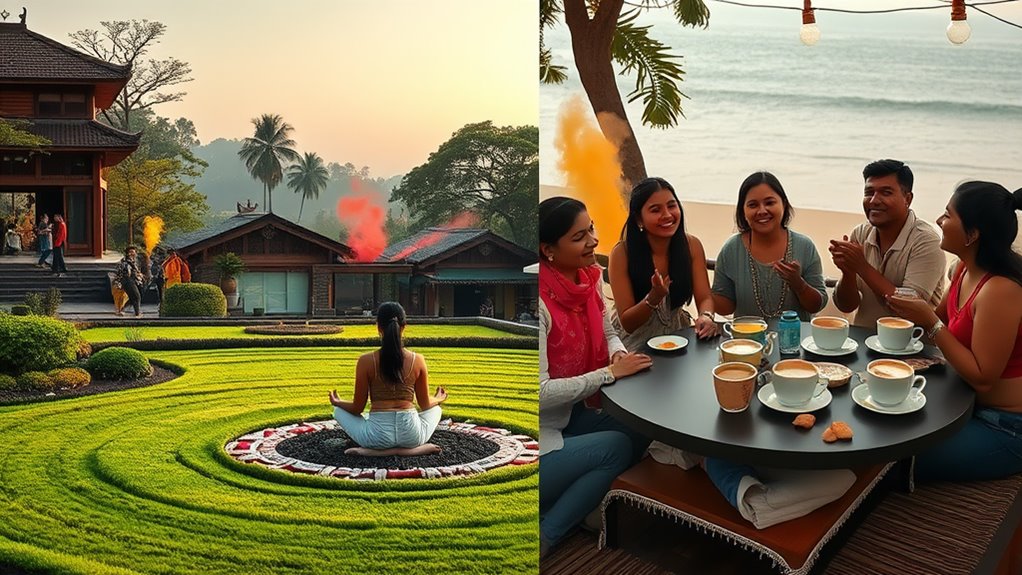Different cultures handle stress and anxiety through unique approaches. In collectivist societies, community support and traditional healing practices offer a sense of belonging and connection. Individualistic cultures often promote personal resilience and self-care techniques, like mindfulness and journaling. Additionally, traditional remedies and mindfulness practices play essential roles worldwide. Understanding these diverse methods can enhance your stress management toolkit. If you’re curious about the specifics of these approaches, there’s more to explore on this topic.
Nomad Highlights
- Collectivist cultures emphasize community support and traditional healing practices, fostering a sense of belonging to alleviate stress and anxiety.
- Individualistic societies promote personal resilience and self-directed coping techniques, such as mindfulness and journaling, to manage stress effectively.
- Cultural stigma influences responses to mental health, often leading to silence around suffering and hindering open discussions about anxiety and stress.
- Diverse stress management methods include a blend of traditional practices, such as herbal remedies, and modern approaches, like physical fitness and mindfulness training.
- Creative activities and rituals, common in many cultures, enhance community connection and emotional resilience, providing collective stress relief.
The Role of Community Support in Collectivist Cultures
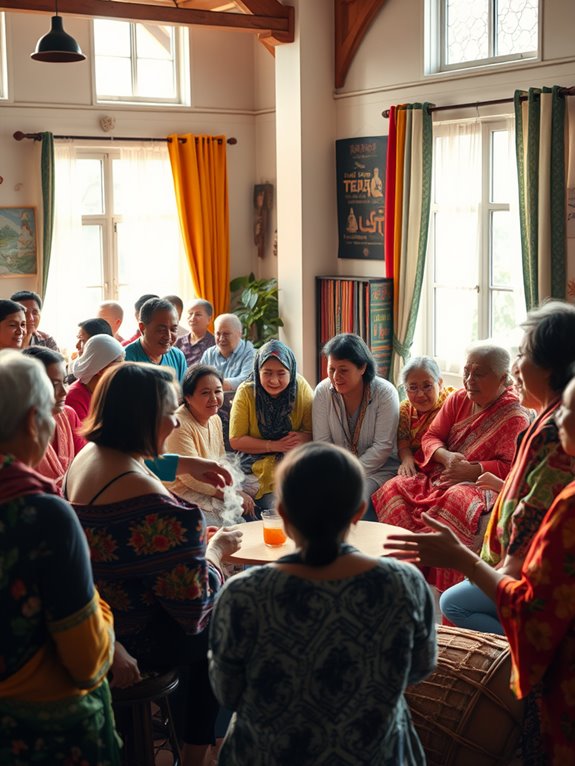
When you’re managing stress and anxiety in collectivist cultures, the role of community support becomes essential. You often find strength in the bonds you share with family, friends, and neighbors. This interconnectedness fosters a sense of belonging, making it easier to cope with challenges together. Engaging in group activities that promote shared experiences can further enhance this sense of community.
When you face difficulties, reaching out for help isn’t just acceptable; it’s encouraged. Your community may offer emotional support, practical assistance, or even traditional practices that promote healing and resilience. Engaging in group activities, sharing experiences, and participating in rituals can alleviate feelings of isolation. By leaning on your community, you not only enhance your well-being but also strengthen those ties, creating a supportive network that helps everyone thrive despite adversity. Additionally, participating in creative activities like stress-relief coloring books can further promote mindfulness and relaxation within the community. Engaging in therapeutic tools such as coloring can serve as a means of collective stress relief, fostering deeper connections among participants. Moreover, utilizing tools like stress balls can provide tactile engagement that complements the emotional support from your community. In these environments, practices such as ankle resistance bands can be integrated into group activities to promote physical well-being alongside mental support.
Individual Resilience and Coping Mechanisms in Individualistic Societies
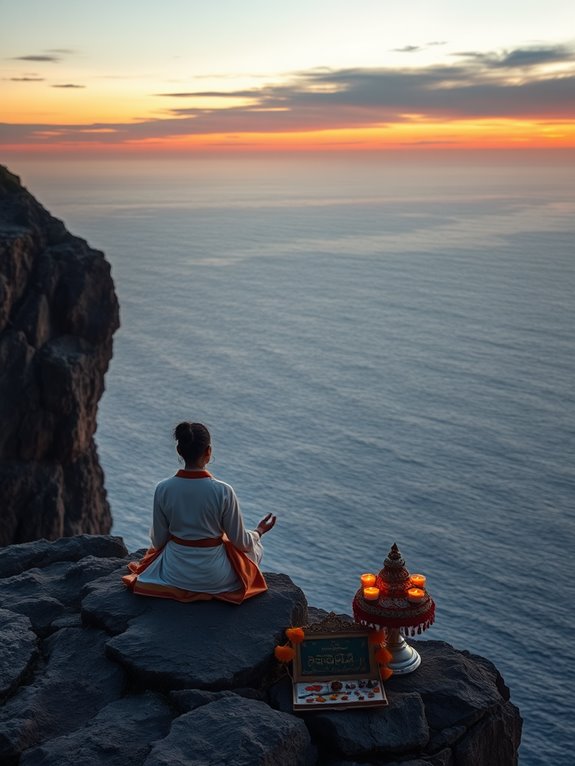
In individualistic societies, you often rely on personal resilience and self-directed coping mechanisms to manage stress and anxiety. You might turn to techniques like mindfulness, journaling, or physical exercise, which empower you to take control of your mental health. Incorporating methods like handheld massagers can also provide immediate relief from muscle tension, enhancing your overall relaxation experience. Additionally, utilizing tools like portable humidifiers can improve air quality and create a more calming environment, further aiding in stress management. The use of stress balls has been shown to promote relaxation and reduce tension through muscle engagement, providing a simple yet effective coping mechanism. Furthermore, employing portable white noise machines can help create a soothing atmosphere, masking disruptive sounds and enhancing your ability to unwind.
Seeking out self-help resources, such as books or online courses, can also provide you with valuable tools and strategies. Networking with others who share similar experiences encourages personal growth and helps you gain new perspectives. However, you might also face pressure to appear strong and self-sufficient, which can make vulnerability feel challenging. Recognizing the importance of self-care and allowing yourself to seek help when needed are essential steps in fostering your resilience and steering through life’s challenges effectively. Additionally, incorporating supplements like melatonin for better sleep can significantly enhance your ability to manage stress and improve overall mental well-being.
Traditional Healing Practices Around the World
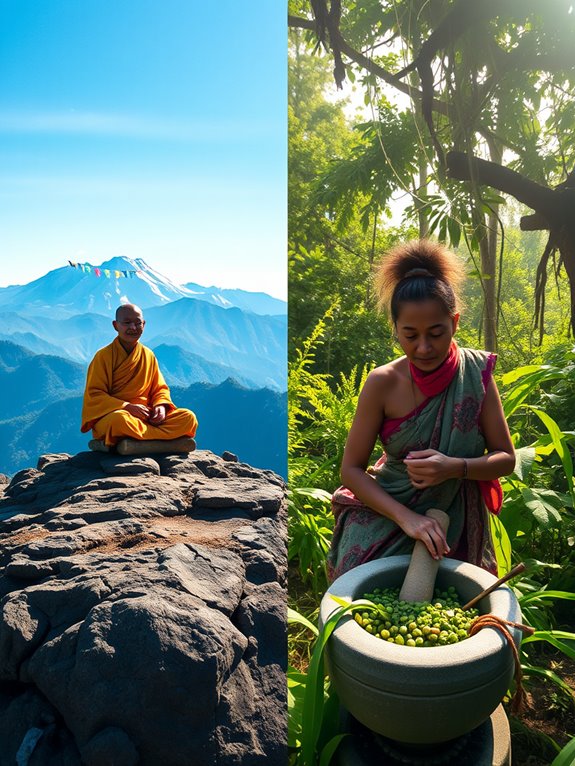
While individual resilience and self-directed coping strategies play a significant role in managing stress and anxiety, many cultures emphasize traditional healing practices that offer alternative approaches.
Many cultures highlight traditional healing practices, showcasing alternative approaches to managing stress and anxiety.
These practices often integrate community support, spiritual beliefs, and natural remedies. You might find these methods helpful in your journey toward wellness:
- Ayurveda: This ancient Indian system uses herbs, diet, and lifestyle changes to balance body and mind. Additionally, hydration tracking is increasingly recognized as a crucial aspect of overall wellness, complementing these traditional practices. Regular practices in Ayurveda can reinforce stress reduction and foster positive thinking patterns over time. Research indicates that mindfulness techniques can enhance the effectiveness of Ayurvedic practices. The incorporation of Tai Chi into daily routines can further support physical and mental well-being.
- Shamanism: Indigenous cultures often rely on shamans for spiritual guidance and healing rituals.
- Traditional Chinese Medicine: This includes acupuncture and herbal medicine to restore harmony within the body.
- African Healing Practices: These involve communal rituals, storytelling, and herbal treatments to address emotional and physical ailments.
Exploring these traditions can provide valuable insights into holistic well-being. Additionally, many of these traditional healing practices are designed to foster connection and promote emotional resilience.
Mindfulness and Meditation: Eastern Approaches to Stress Relief

Although stress and anxiety are universal experiences, Eastern approaches like mindfulness and meditation offer unique tools for coping. You can cultivate mindfulness by focusing on the present moment, which helps ground you amidst chaos. Many techniques, such as anti-glare technology, can significantly improve your ability to focus by reducing distractions in your environment. Additionally, incorporating portable essential oil diffusers into your mindfulness practice can enhance the calming atmosphere and promote relaxation. Using essential oils with calming properties can further elevate your relaxation experience.
Incorporating a digital detox timer into your routine can also help manage your screen time and improve focus during mindfulness practices.
By practicing meditation, you train your mind to observe thoughts without judgment, fostering a sense of calm. Techniques like deep breathing and guided imagery can ease tension and promote relaxation. Regular use of acupressure mats can also contribute to relaxation and pain relief, enhancing your overall well-being.
Incorporating these practices into your daily routine can enhance your emotional resilience. Whether you sit quietly for a few minutes or engage in mindful walking, each moment spent in stillness can recharge your mental state.
Embracing these Eastern methods allows you to navigate life’s challenges with greater ease and clarity.
The Impact of Cultural Stigma on Mental Health
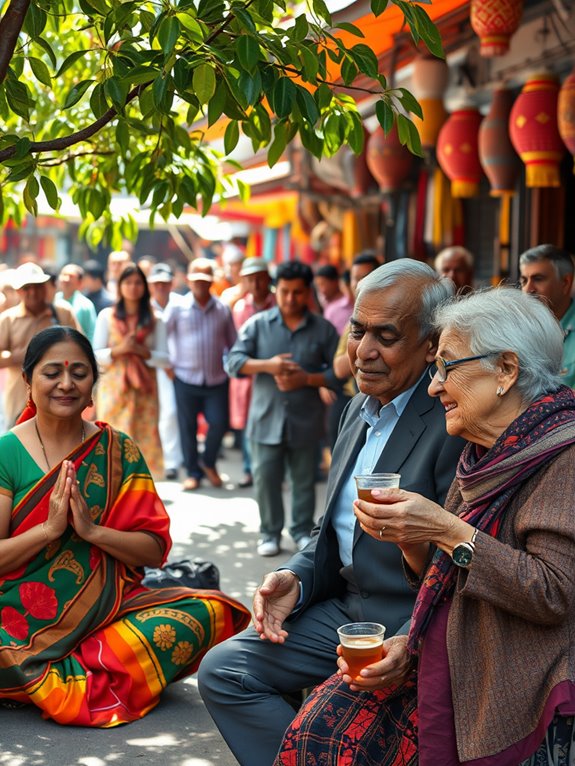
Cultural stigma around mental health can heavily influence how you perceive and respond to mental illness. Often, silence surrounds suffering, preventing open discussions and leading individuals to seek traditional healing practices instead. Understanding these dynamics can help you navigate the complexities of mental health in different cultural contexts. Additionally, recognizing the importance of emotional intelligence can enhance your ability to empathize and connect with those facing mental health challenges. Furthermore, many individuals turn to unique products that cater to their specific needs in managing stress and anxiety, which can be a valuable resource in various cultures. In many cases, these products are designed to promote well-being and can play an essential role in self-care routines across different communities. As a result, exploring culturally tailored resources can provide deeper insights into effective stress management strategies in different societies. Many cultures also embrace holistic approaches that prioritize the integration of mind, body, and spirit in their mental health practices.
Cultural Perceptions of Mental Illness
Stigma surrounding mental illness can deeply affect individuals’ willingness to seek help. In many cultures, mental health issues are misunderstood or viewed negatively, which can lead to feelings of shame and isolation.
You might encounter various perceptions shaped by cultural beliefs, including:
- Belief in supernatural causes: Some cultures attribute mental illness to spiritual or supernatural factors.
- Fear of judgment: Many people worry about being judged or ostracized by family and friends if they disclose their struggles.
- Value of resilience: In certain cultures, enduring hardship without seeking help is often seen as a sign of strength. Additionally, the belief that seeking natural pain relief through self-care methods can be viewed as a weakness may further deter individuals from addressing their mental health needs. Understanding the importance of holistic wellness approaches can help shift this perspective. Furthermore, recognizing that successful online product sales can promote mental health resources may encourage individuals to seek help. Moreover, biofeedback devices can serve as effective tools for individuals to gain awareness of their physiological responses, helping to manage stress levels and improve emotional resilience through real-time feedback.
- Lack of awareness: Limited education about mental health can perpetuate misconceptions and hinder open discussions.
These perceptions can create barriers, making it harder for you to prioritize your mental well-being. Moreover, the lack of awareness about mental health benefits can prevent individuals from understanding the importance of seeking help.
Silence and Suffering
Silence often amplifies suffering, especially in cultures where discussing mental health is taboo. You might feel isolated, believing no one understands your struggles. This silence can lead to shame, making it harder for you to seek help. In many cultures, the importance of community support can play a crucial role in alleviating stress and anxiety.
When mental health issues are stigmatized, you may internalize your pain, fearing judgment or rejection from family and friends. Instead of opening up, you might suppress your feelings, which can worsen your anxiety and stress. Journaling prompts that encourage emotional exploration can help you articulate your feelings and begin breaking the silence. Engaging in biofeedback practices can also provide valuable insights into managing stress and improving overall mental well-being. Additionally, breathwork techniques can offer a structured approach to emotional regulation and self-discovery.
Recognizing that many others face similar challenges can be empowering. It’s important to break this cycle of silence by initiating conversations about mental health, even if it feels uncomfortable. Incorporating breathwork practices can provide a supportive tool for managing anxiety and fostering emotional resilience.
Traditional Healing Practices
When you’re grappling with stress and anxiety, you might find comfort in traditional healing practices that have been passed down through generations.
These methods often carry cultural significance and can provide a sense of belonging. However, cultural stigma around mental health may affect your willingness to seek these alternatives.
You might consider:
- Herbal Remedies: Utilizing local plants believed to alleviate anxiety.
- Meditation and Mindfulness: Engaging in spiritual practices that promote inner peace.
- Community Rituals: Participating in group ceremonies for emotional support.
- Storytelling: Sharing experiences and wisdom through narratives to foster connection.
Embracing these practices can help you navigate your mental health journey while respecting cultural beliefs and reducing stigma.
Modern Adaptations: Integrating Tradition With Contemporary Practices
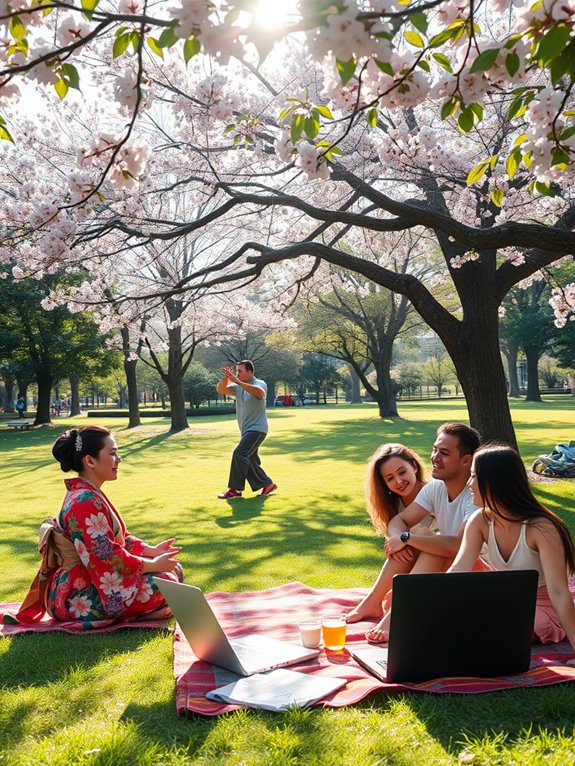
While many cultures have long relied on traditional practices to address stress and anxiety, modern adaptations are blending these time-honored methods with contemporary techniques to create more effective strategies. You might find that yoga’s roots in ancient India now incorporate mindfulness practices from Western psychology. Similarly, traditional herbal remedies are often complemented by modern nutritional science.
| Traditional Practice | Modern Adaptation |
|---|---|
| Meditation | Mindfulness-Based Stress Reduction |
| Herbal Remedies | Nutritional Supplements |
| Tai Chi | Fitness Classes |
| Aromatherapy | Essential Oil Workshops |
Frequently Asked Questions
How Does Cultural Background Influence Stress Response and Management?
Your cultural background shapes how you perceive stress, influencing your coping mechanisms and emotional responses. You might find comfort in community support, while others may lean towards individualistic strategies, affecting overall stress management.
What Are Common Misconceptions About Mental Health in Different Cultures?
You might think mental health issues are universally understood, but many cultures hold misconceptions that stigmatize seeking help, equate it with weakness, or overlook emotional struggles, affecting individuals’ willingness to discuss their mental health openly.
How Can Understanding Cultural Differences Improve Mental Health Support?
Understanding cultural differences helps you tailor mental health support effectively. It fosters empathy, builds rapport, and guarantees you address specific needs, ultimately enhancing communication and trust between you and those seeking help.
Are There Universal Stress Relief Techniques Across Cultures?
You might find it comforting to know that many cultures embrace simple, universal techniques for stress relief, like deep breathing or gentle movement. These methods can help you unwind and reconnect, regardless of where you are.
How Does Globalization Affect Traditional Stress Management Practices?
Globalization blends traditional practices with modern influences, often diluting cultural authenticity. You might find unique stress relief methods evolving, as local techniques adapt to global trends, creating a mix that reflects both heritage and contemporary lifestyles.
Conclusion
In steering through stress and anxiety, you’ll find a rich tapestry woven from diverse cultural threads. Picture the warm embrace of community support in collectivist societies, juxtaposed with the solitary strength of individual resilience. Imagine the soothing scents of traditional healing herbs mingling with the calming rhythms of mindfulness practices. By blending these age-old traditions with modern approaches, you can create a vibrant toolkit for mental well-being, helping you flourish amidst life’s storms. Embrace this journey of discovery!

